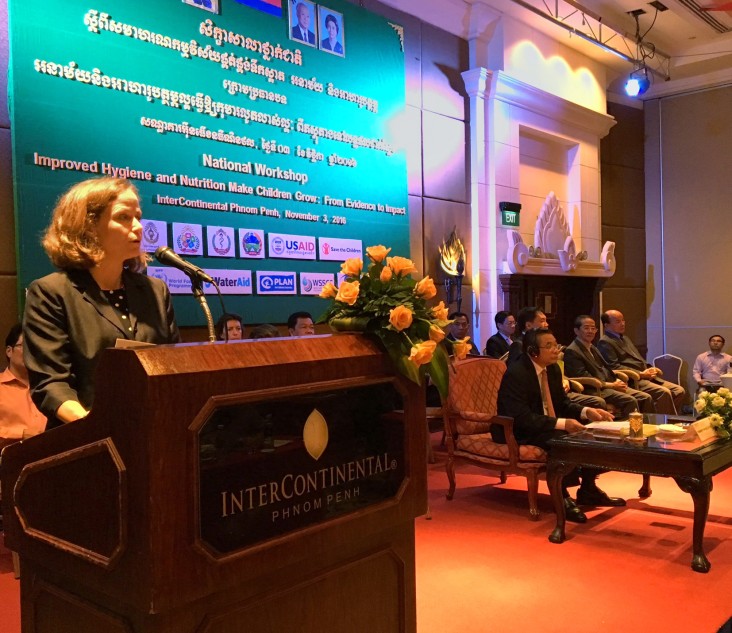
(as prepared for delivery)
- Your Excellency Yim Chhay Ly, Deputy Prime Minister and Chairman of the Council for Agricultural and Rural Development
- Your Excellency Dr. Chea Samnang, Director of the Cabinet of the Deputy Prime Minister and Water Supply and Sanitation Collaborative Council National Coordinator
- Distinguished guests, development partners, ladies and gentlemen.
The fact that we are here together as we prepare for Cambodia’s Third National Nutrition Day. This year’s theme -- “Improved Sanitation, Hygiene and Nutrition Make Children Grow” – is not only a fact, it’s a call to action. It is also a strong testament to Cambodia’s continued commitment to improve nutrition for mothers and children.
The theme of the National Nutrition Day as well as the workshop today is well-timed. The most recent data tell us that stunting is the most prevalent form of child malnutrition worldwide, including in Cambodia. One third of Cambodian children under five are stunted. We know that the situation has improved substantially over the last five years, but that is a sobering statistic that deserves our concentrated attention and joint action.
It is untreatable, and stunting can be very harmful to children - impairing their mental development and educational performance and leading to lower wages and lost productivity later in life.
But it is also preventable. It requires us to act within the first 1,000 days of life - from conception to two years old. Stunting is the result of an array of complex factors. These include food insecurity and inadequate nutrition. The lack of access to quality health services – particularly child care – is also an important cause. Inadequate access to water, sanitation, and hygiene all play a part in this, too. But it also depends on where you live. There are significant differences in access between children in urban and rural areas of the country. As you can imagine, the same applies to children in the highest wealth quintile compared to children in the poorest wealth quintile. Winning the battle against stunting calls for a multi-sectoral response.
With the support of President Obama’s Feed the Future initiative, USAID is proud to partner with the Royal Government of Cambodia to tackle the problem of stunting. Working together, we’re focusing our efforts on the first 1,000 days of Cambodian children’s lives. We want our efforts to save lives, build resilience, increase economic productivity, and advance the country’s development. Our NOURISH project, led by Save the Children and the Rice Field Fisheries II project led by WorldFish are two key initiatives supporting these efforts.
Today’s event presents a unique opportunity to gain a deeper understanding the challenges and opportunities ahead of us. I’m confident that if we work together, we will improve the lives of Cambodian mothers and their children.
Thank you.
Related Speeches
- Remarks by Polly Dunford, Mission Director, USAID Cambodia, Launch Event of Feed the Future Cambodia Harvest II
- Remarks by Christina Lau, Deputy Director, Office of Public Health and Education, USAID/Cambodia, Opening Ceremony of the Kick-Off Workshop for “One Health Workforce”
- Remarks by Veena Reddy, Deputy Mission Director, USAID Cambodia, EPIC Showcase







Comment
Make a general inquiry or suggest an improvement.